Why You Should Always Take These 10 Stomach Ulcer Symptoms Seriously
 By: by Amino Science
By: by Amino Science
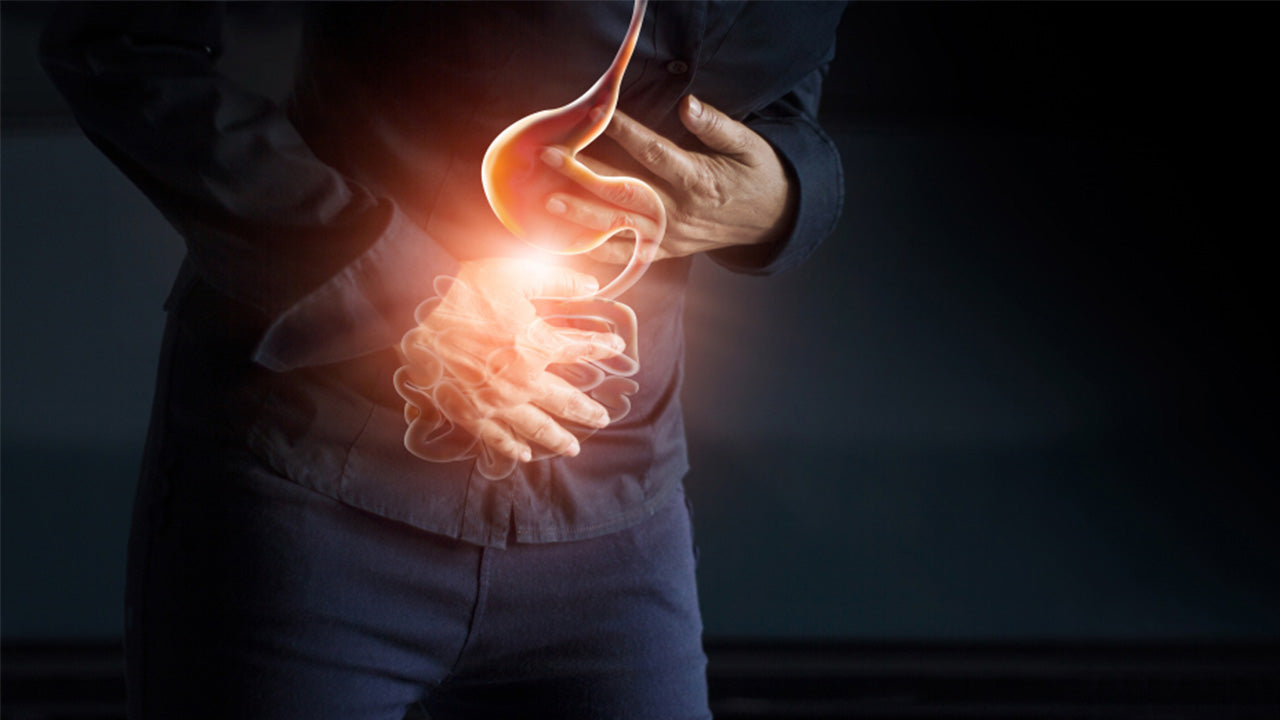
If you have chronic stomach pain, the cause may be stomach ulcers. The good news is, stomach ulcers are highly treatable. But it’s extremely important that you seek treatment without delay. When left untreated, stomach ulcers can cause serious, even lethal, health problems. There are many misconceptions about what causes stomach ulcers and the different types of ulcers. In this article, we’ll give you a clear breakdown of what a stomach ulcer is, 10 stomach ulcer symptoms to look out for, the available stomach ulcer treatment options once your diagnosis has been confirmed, as well as how to lower your risk of developing ulcers.
What Is a Stomach Ulcer?
The term stomach ulcer refers to painful open sores that develop in the lining of the stomach. In order for stomach ulcers, a sub-type of peptic ulcers, to grow, something must happen to thin out the typically thick layer of mucus that protects your stomach lining from caustic digestive juices.
While people used to believe that excess stress and an overabundance of stomach acid caused ulcers, we now know that the real causes of stomach ulcers are almost always a Helicobacter pylori (H. pylori) infection or the long-term use of nonsteroidal anti-inflammatory drugs (NSAIDs) like aspirin, ibuprofen, and naproxen.
There are a number of effective treatments for stomach ulcers, as well as methods for reducing your susceptibility. When left untreated, however, they can become quite severe. If a stomach ulcer evolves into a bleeding ulcer, it can become life-threatening and require hospitalization. So, if you think you may have an ulcer, you should seek treatment promptly!
Watch for These 10 Stomach Ulcer Symptoms
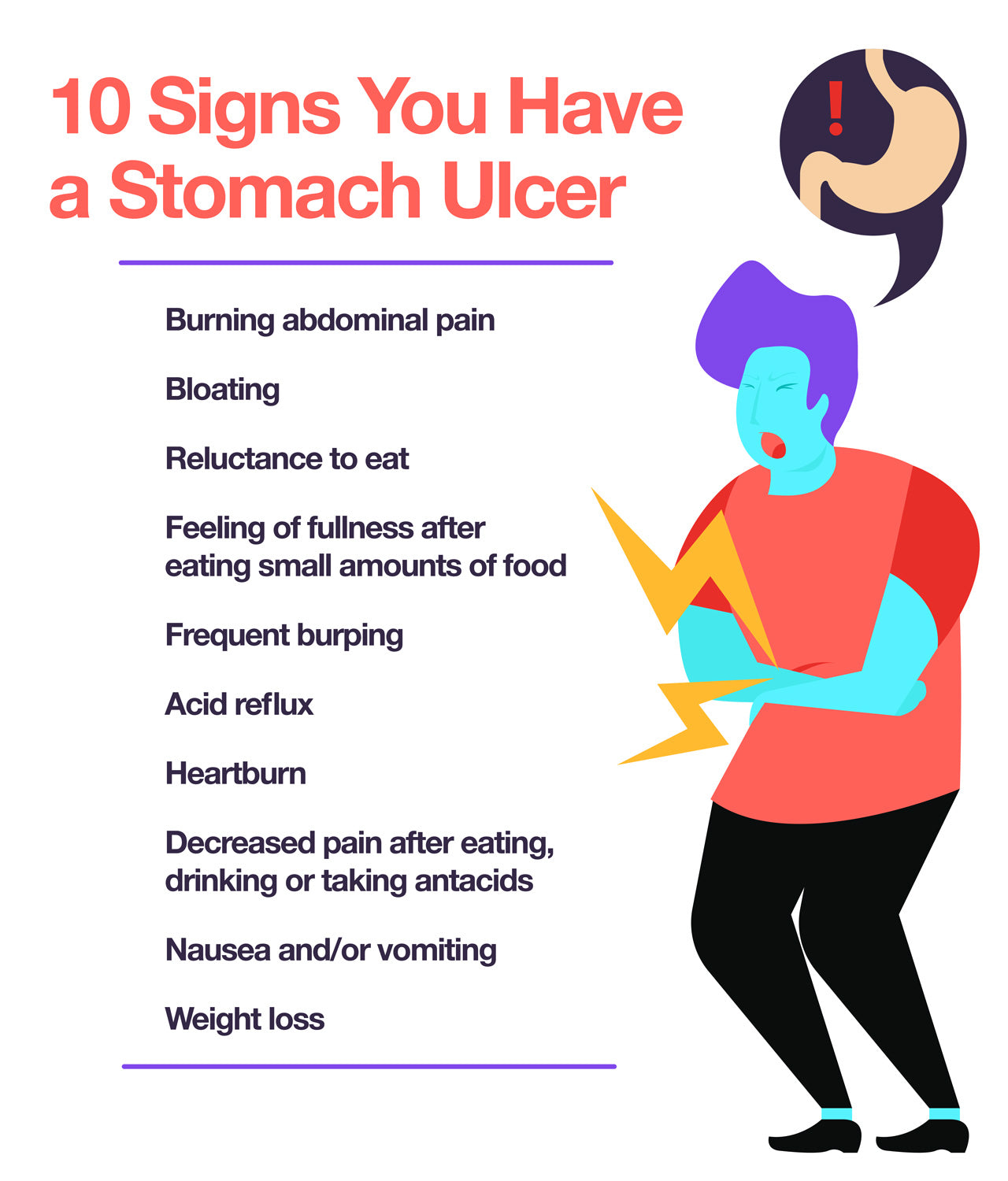
The severity of the ulcer determines the severity of your stomach ulcer symptoms. A common early stomach ulcer symptom is a burning sensation in your abdomen between your chest and belly button. Stomach ulcer pain often increases when your stomach is empty. The length of time the pain is present can vary from a few minutes to several hours.
Other common signs of a stomach ulcer include:
- Bloating
- Reluctance to eat due to stomach pain
- A feeling of fullness after eating only a small amount of food
- Frequent burping
- Acid reflux
- Heartburn
- Decreased pain after eating, drinking, or taking antacids
- Nausea and/or vomiting
- Weight loss
If you’re regularly experiencing symptoms of a stomach ulcer, you should talk to a doctor. Even if your symptoms are currently quite mild, ulcers get worse when left untreated and became the most dangerous type of ulcer, a bleeding ulcer.
It’s possible for an ulcer to bleed so slowly, you may miss the symptoms. The first indications of a slow-bleeding ulcer may appear when you develop anemia, at which point you may see signs like excessive fatigue, shortness of breath, lightheadedness, and pale skin.
When a stomach ulcer is bleeding heavily, you’ll see changes in stool: it may be black and sticky, or you may see dark red blood in the stool. Immediately consult a doctor if you’re experiencing those type of stool changes. Another symptom that indicates you should seek immediate medical attention is bloody vomit with a consistency like coffee grounds. Remember, rapid-bleeding ulcers can be fatal. It’s vital that you take these symptoms seriously and get urgent medical help.
Determining Which Stomach Ulcer Treatment Is Right for You
The right treatment for your stomach ulcer will depend on its underlying cause. If you seek treatment before your ulcer becomes too severe, all you’ll need is a prescription from your doctor. If your ulcer has begun to bleed, however, you will probably need to be hospitalized so you can receive intensive treatment. In certain instances, a blood transfusion may be required. And in rare cases, you may need surgery to fully treat your stomach ulcer.
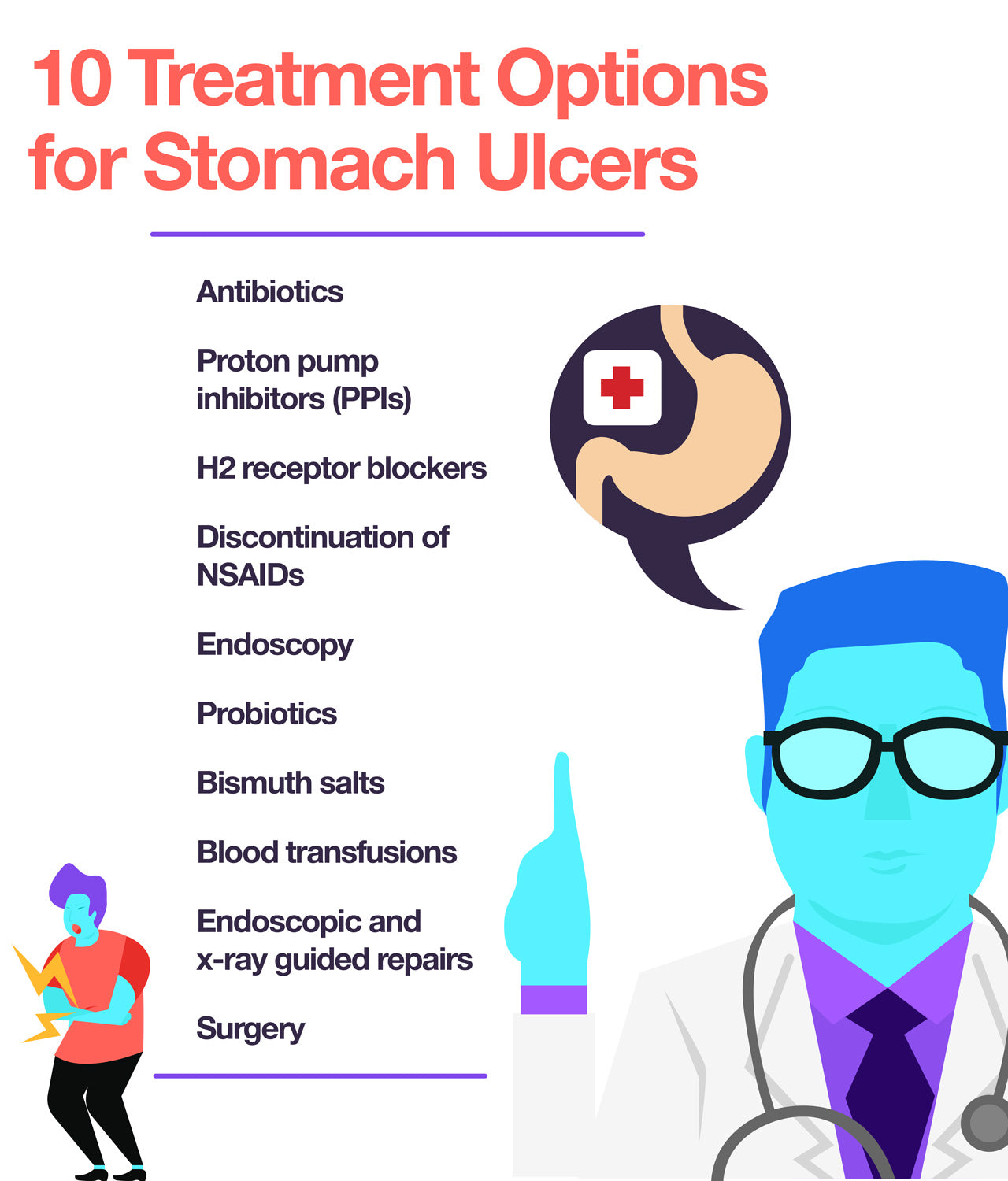
Outpatient Treatment Options for Stomach Ulcers
If your stomach ulcer was caused by an H. pylori infection, your doctor will use a combination of antibiotics and a class of drugs known as proton pump inhibitors (PPIs) to treat it. Antibiotics resolve the infection while PPIs inhibit the production of irritating stomach acid.
It’s much less common for ulcers to develop without the presence of H. pylori, but it can happen when high doses of NSAIDs are used for long periods of time, for example, to treat chronic pain caused by arthritis or other inflammatory conditions. In those cases, you won’t need antibiotics, though it’s quite likely you will be prescribed a PPI.
Some additional treatments your doctor may suggest for treating ulcers caused by H. pylori as well as those caused by long-term, high-dose NSAID use include:
- H2 receptor blockers, another type of drug that blocks stomach acid production
- Discontinuation of all NSAID pain relievers
- Endoscopy, a nonsurgical procedure used to examine your intestines, to ensure the ulcer has healed
- Probiotics, to assist with the eradication of H. pylori and rebalance your gut flora
- Bismuth salts, which soothe inflammation and help eradicate harmful bacteria
Once you begin a course of treatment, your stomach ulcer symptoms should subside quickly. That doesn’t mean you should discontinue treatment though! Be sure to finish the full course of all medications your doctor prescribed, especially antibiotics.
In-Patient Treatment Options for Stomach Ulcers
If you have a severely bleeding ulcer or a complicated ulcer, you may need more intensive treatment. An endoscopy may be used to identify the cause of the bleeding, and endoscopic or x-ray guided treatment may be used to stop the bleeding.
The medications mentioned above may be given intravenously (through an IV) so they take effect more quickly. You may also need a blood transfusion.
In rare cases, surgery may be required. Characteristics of ulcers that might require surgical intervention include:
- Continuing to reoccur
- Failure to heal
- Bleeding that does not respond to other treatments
- Tearing through the stomach wall
- Preventing the movement of food into the small intestine
Several different surgical approaches can be used, including removing the entire ulcer, patching the site of the ulcer with tissue from another part of the intestine, tying off the bleeding artery, and cutting off nerve supply to the stomach in order to reduce the production of stomach acid.
How to Lower Your Risk of Developing Ulcers
Once you’ve had a stomach ulcer, and successfully treated it, you’ll probably be very committed to doing whatever you can to avoid developing another one. People used to think that eating certain foods—in particular, spicy or sour foods—could cause or irritate ulcers. Some people do find that eating certain foods increases the discomfort associated with ulcers, but there’s no evidence that your diet causes ulcers. When it comes to prevention, the Gastrointestinal Society reports that medical professionals now put the emphasis on eating a high-fiber diet loaded with a variety of fruits and vegetables.

Some foods also contain compounds that can help flush H. pylori bacteria from your system and boost your populations of healthy gut bacteria. Adding the following foods to your diet will maximize the health of your digestive system:
- Cruciferous vegetables like broccoli, cauliflower, cabbage, and Brussels sprouts
- Dark, leafy greens like spinach and kale
- Probiotic-rich foods including kefir, yogurt, sauerkraut, miso, and kombucha
- Apples
- Berries
- Olive oil
- Honey
Scientists from Beth Israel Deaconess Medical Center and the Massachusetts Institute of Technology led a study which demonstrated that glutamine can help neutralize gastric damage caused by H. pylori. Glutamine’s effect stems, at least in part, from its ability to decrease inflammation.
Food sources of glutamine include fish, chicken, eggs, spinach, and cabbage.

Up to 25% off Amino
Shop NowTAGS: conditions
Join the Community
Comments (0)
Most Craveable Recipes
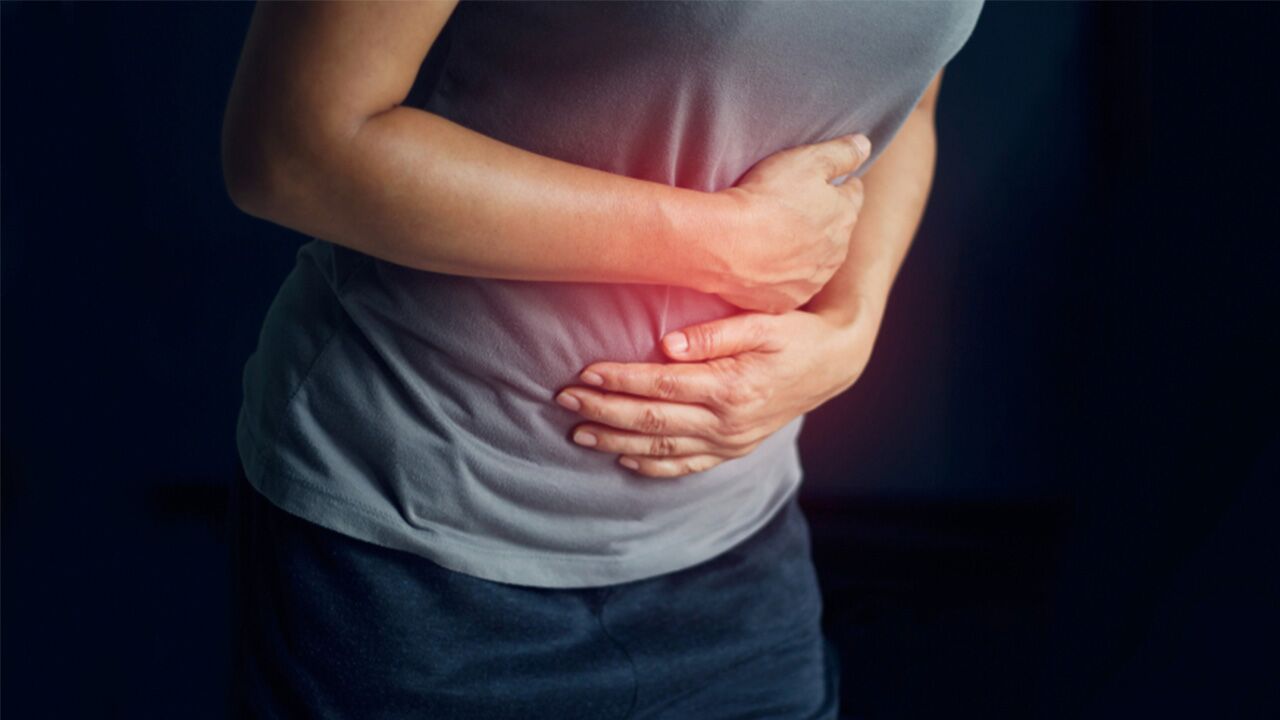
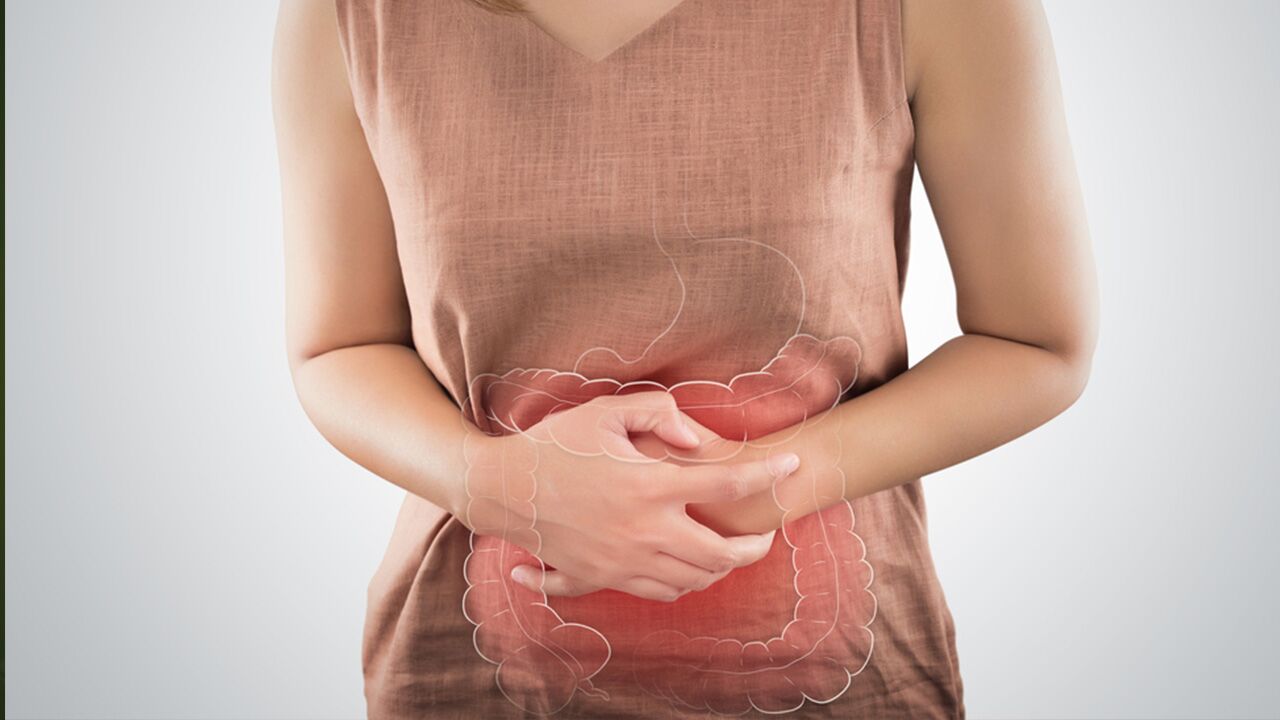


 833-264-6620
833-264-6620



















